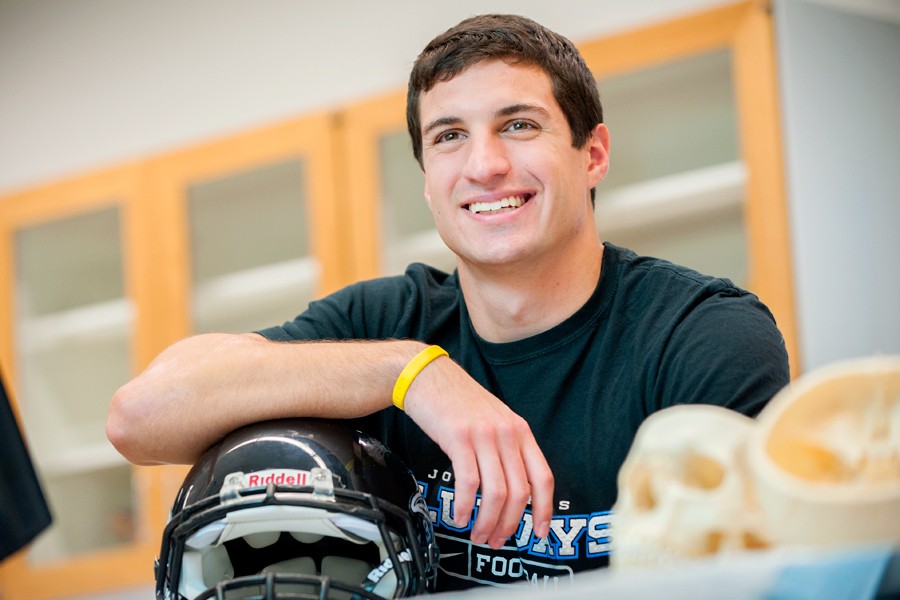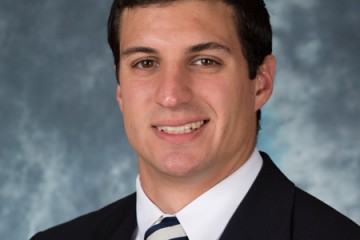Film study in football has been elevated to a science. In the buildup to game day, each team dissects the other to the point that it knows every tick and gesture a wide receiver makes before he slants, and which linebacker is most likely to bite on a pump fake.
Johns Hopkins senior strong safety John Arena studies game tape as if a biology final grade rides on it. Arena, team captain and one of the leaders of a stingy Blue Jays defense, chalks up his appetite for film to a competitive nature and an overall hunger for knowledge.
Blue Jays defensive coordinator Mickey Rehring says that by the time the Tuesday meeting rolls around, Arena has watched endless hours of tape and thoroughly scouted the next opponent.
"Even before the coaches get together to meet that week, John has already sized up his own way of attacking things. I couldn't ask for a better resource to knock ideas around with," says Rehring, now in his second year with the team. "I like to say that I base the success of my game plan on the number of nods I get from John in the meeting room. If he's nodding, I must have done my homework."
Arena's preparedness comes as no surprise to those who know him. Whether it's a research project or a 3rd-and-short situation, Arena wants to stay three or four steps ahead.
His dedication has paid off.
The neuroscience major carries a 4.0 GPA, and last year he earned first-team Academic All-American honors, only the seventh player in school history to do so. He finished third on the team in tackles with 64, including seven for a loss.
With Arena anchoring the defense, the Blue Jays went 10-2 in 2012 and advanced to the second round of the NCAA Division III playoffs. The 2013 team may be even stronger. As of press time, Johns Hopkins was 6-0 and ranked No. 12 in the nation.
The Blue Jays defense has given up an average of only 12.5 points per game, and no team has scored more than 17. Arena once again ranks among the team leaders in tackles, and has tallied three sacks and one forced fumble to date.
Rehring says that the stalwart defense is a testament to the work ethic, and smarts, of players like Arena.
"John constantly puts himself in the best position to make plays," Rehring says. "Perhaps John's best asset is his intelligence. He comprehends and dissects things incredibly fast. It's hard to say anyone is the perfect football player, but John is one of the best I've seen. He's a special kid and talent."
Arena, a native of Bryn Mawr, Pa., began playing football in fourth grade. He describes those early games as "chaotic," a lot of tiny kids in uniforms bumping into each other. With small rosters—his first team had only 13 players—Arena learned to play both sides of the ball.
Football has long been in Arena's blood. His father owns Philadelphia Eagles season tickets, and the two spent many Sundays at Veterans Stadium and later Lincoln Financial Field rooting for the home team and his favorite player, Brian Dawkins, the perennial Pro Bowl safety who retired in 2011.
"Dawkins played with such great intensity and emotion. It's easy to admire him," Arena says. "He's a great leader, a great player."
In high school, Arena didn't see much game time his first two years, but he stayed determined to make an impact. Arena says he tried out for quarterback, but his skill set didn't match the position.
"One coach told me early on I probably wasn't going to be QB, but I was OK with it. I just wanted to get on the field, and I was happy playing on defense. Better to hit than be hit, I told myself," he says.
He played mostly on special teams his junior year, and as a senior he finally earned a starting spot and made the most of his opportunity.
His performances on the field attracted several schools, including Johns Hopkins. Arena says the chance to attend a school with the academic stature of JHU and stay relatively close to home made his decision to come to Baltimore an easy one.
Arena also knew he wanted to major in neuroscience, and was naturally attracted to Johns Hopkins. With an orthopedic surgeon as a father, Arena grew up in a medical setting. He often shadowed his father in the hospital and later spent many hours at his father's private practice doing odd jobs such as painting the walls or setting up the wireless connection.
Another inspiration for Arena is his mother, a brain cancer survivor who underwent major surgery when he was a toddler.
"The acute aspects of her condition I was too young to remember, but it certainly has had an impact on me," he says. "Medicine has always been a big part of my life."
Arena says he loved neuroscience from the very first class. He revels in the mysteries of the brain's operation and says that each week he learns something new and incredible.
Currently, Arena works in the lab of Vassilis Koliatsos, a professor of neurology and pathology at the School of Medicine, who for the past 25 years has done extensive work modeling neural injury. Arena's work has focused on a project dealing with neurodegeneration pathology from long-term, mild, and repetitive brain injuries. He focuses mostly on chronic traumatic encephalopathy, the disease that has garnered widespread media attention because of its connection with concussions in football.
Arena says he's fully aware of the irony of playing such a physical and sometimes violent sport and then transitioning to the lab, where he literally examines cross-sections of brains that underwent head trauma.
For Arena, his work is part crusade.
"I guess you can say I'm doing this to both protect myself and help save football," Arena says. "Very little is known about CTE. Certainly not every player gets the disease. It's likely a combination of genetic and environmental factors. The more we know about the disease will allow us to make better decisions. If football is to stick around, we have to learn more about the science and not bury our heads in the sand."
On the field, Arena says, it's easy to separate out his academic side.
He thrives on the competition, he says, and embraces the team aspect of football. When asked about a favorite moment on the field, Area says it's any time the defense works in unison.
"When we all do our jobs of covering the receiver and the quarterback can't make a throw, and then a defensive end winds up getting a sack, that to me is a thing of beauty," he says. "You can contribute without making it into the stats book."
When he was entering senior year, his teammates voted him captain. He was also selected president of his fraternity, Alpha Delta Phi.
Rehring says Arena is a natural leader to whom younger players gravitate. "John leads by example. He just commands respect by his work ethic and doing the right things," Rehring says.
Arena says that as a strong safety, he enjoys the best of all worlds. He can drop back in pass coverage, rush the quarterback, or work to stop the run.
Overall, he enjoys winning.
Right now his goal is to help the team win the Centennial Conference and earn the automatic bid to the NCAA Division III playoffs and its field of 32 teams. Beyond that, he hopes the Jays earn a high seed and make a deep title run.
"[Head] coach [Jim] Margraff has created a culture of winning, and everyone is trying to do their part," Arena says. "Everyone is all in."
As to what part of his game he needs to improve, Arena says it's the depth of his drops. And when he does get burned, he needs to continue to possess a short memory. "You can't let a missed tackle, or a receiver catching the ball, get you down," he says. "You move on to the next play."
Arena plans to finish his studies in December, as he's earned enough credits during Intersessions to fulfill his requirements. He plans to attend medical school, but right now football has his primary attention.
The next game awaits, and Arena has more film to study.
Posted in Athletics, Student Life
Tagged football









